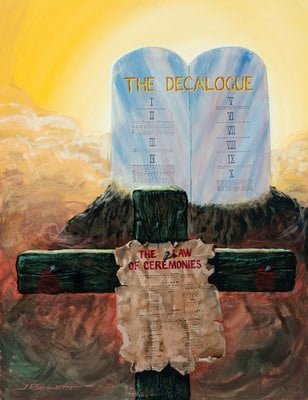Monday: Jewish Laws and Regulations
As time allows, skim through the book of Leviticus. (See, for instance, Leviticus 12, Leviticus 16, Leviticus 23.) What thoughts come to your mind as you read all these rules and regulations and rituals? Why would many of these be all but impossible in New Testament times to follow?
It is convenient for us to classify Old Testament laws into various categories: (1) moral law, (2) ceremonial law, (3) civil law, (4) statutes and judgments, and (5) health laws.
This classification is in part artificial. In actuality some of these categories are interrelated, and there is considerable overlap. The ancients did not see them as separate and distinct.
The moral law is summed up by the Ten Commandments (Exod. 20:1-17). This law sums up the moral requirements of humanity. These ten precepts are amplified and applied in various statutes and judgments throughout the first five books of the Bible. These amplifications show what it meant to keep the law of God in various situations. Not unrelated are the civil laws. These, too, are based on the moral law. These define a citizen’s relationship to civil authorities and to fellow citizens. They name the penalties for various infractions.
The ceremonial law regulated the sanctuary ritual, describing the various offerings and the individual citizen’s responsibilities. The feast days are specified and their observance defined.
The health laws overlap the other laws. The various laws relating to uncleanness define ceremonial uncleanness, and yet they also go beyond this to include hygienic and health principles. Laws regarding clean and unclean meats are based on physical considerations.
While the Jew probably largely thought of all of these laws as a package, having all come from God, he or she must have made certain distinctions mentally. The Ten Commandments had been spoken by God directly to the people. This would set them apart as especially important. The other laws had been relayed through Moses. The sanctuary ritual could be kept only while a sanctuary was in operation.
The civil laws, at least in large part, could no longer be imposed after the Jews lost their independence and came under the civil control of another nation. Many of the ceremonial precepts could no longer be observed after the temple was destroyed. Also, after the Messiah came, many of the types had met their antitypes and no longer had validity.


Why
Bob, I think the types lost their validity only because they were not the real thing but were only symbols used to represent the real thing which was Christ and His sacrifice paying for our pardon in reality instead of only representing it as a “type” of it.
This then shows the moral laws are from eternity past to eternal future immutable since they’re are the very essence the transcript of God’s character. They don’t change with circumstances as do the others.
Jesus fulfilled everything that the moral and ceremonial laws required of God’s OT people and us NT people. Now we just need to by faith follow Jesus’ teachings and guidelines that are summed up with the two great commandments: 1.Love god completely and totally and 2. Love our neighbors as ourselves.
The question in my mind made clear now. When the Jews where taken into captivity the laws of the temple could not be practiced. But Daniel and his three buddies kept the dietary and morale laws. Great revelation. Thank you.